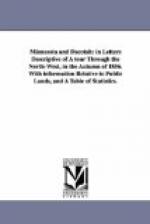I suppose, when they take the requisite oaths.
In this way many valuable claims are taken up and
held along from month to month, or from year to year,
by mock improvements. A pretender will make just
improvements enough to hinder the actual settler from
locating on the claim, or will sell out to him at
a good profit. A good deal of money is made by
these fictitious claimants. It is rather hard
to prevent it, too, inasmuch as it is difficult to
disprove that a man intends some time to have a permanent
home, or, in fact, that his claim is not his legal
residence, though his usual abiding place is somewhere
else. Nothing could be more delightful than for
a party of young men who desire to farm to come out
together early in the spring, and aid each other in
preempting land in the same neighborhood. The
preemptor has to pay about five dollars in the way
of fees before he gets through the entire process
of securing a title. It is a popular error (much
like the opinion that a man cannot swear to what he
sees through glass) that improvements of a certain
value, say fifty dollars, are required to be made,
or that a certain number of acres must be cultivated.
All that is required, however, is evidence that the
party has built a house fit to live in, and has in
good faith proceeded to cultivate the soil. The
law does not permit a person to preempt 160 acres
but once; yet this provision is often disregarded,
possibly from ignorance, I was about to say, but that
cannot be, since the applicant must make oath that
he has not before availed himself of the right of
preemption.
I will insert at this place an abridgment of the preemption
act of 4th September, 1841, which I made two years
ago; and which was extensively published in the new
states and territories. I am happy to find, also,
that it has been thought worth copying into one or
more works on the West.
I. Lands subject to preemption. By sec. 10 of
said act it is provided that the public lands to which
the Indian title had been extinguished at the time
of the settlement, and which had also been surveyed
prior thereto, shall be subject to preemption, and
purchase at the rate of one dollar and twenty-five
cents per acre. And by the act of 22d July, 1854,
sec. 12, the preemption of unsurveyed lands is recognised
as legal. Lands of the following description
are excepted: such as are included in any reservation,
by any treaty, law, or proclamation of the President
of the United States, or reserved for salines or for
other purposes; lands included within the limits of
any incorporated town, or which have been selected
as the site for a city or town; lands actually settled
and occupied for the purposes of trade and not agriculture;
and lands on which are situated any known salines or
mines.
II. The amount designated is any number of acres
not exceeding one hundred and sixty.




